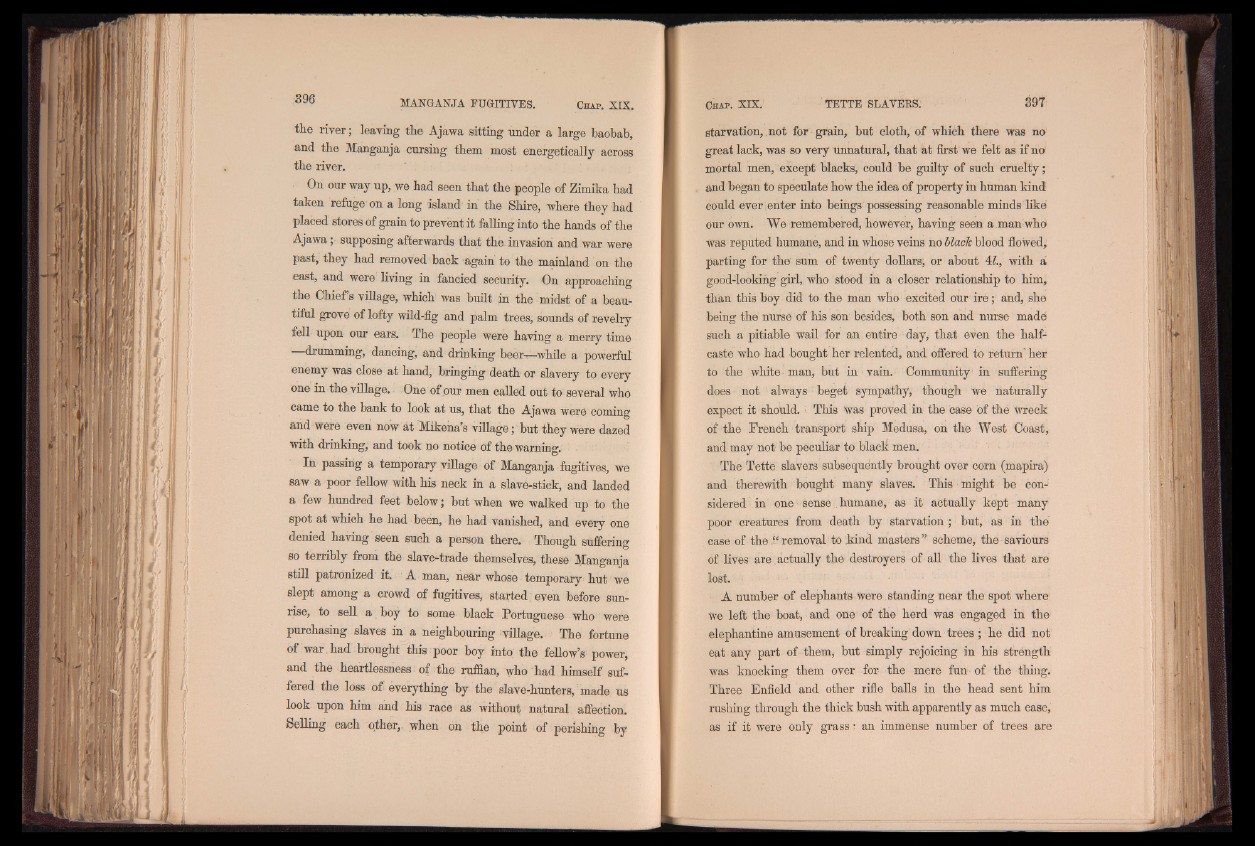
the river; leaving the Ajawa sitting under a large baobab,
and the Manganja cursing them most energetically across
the river.
On our way up, we had seen that the people of ZimiK had
taken refuge on a long island in the Shire, where they had
placed stores of grain to prevent it falling into the hands of the
Ajawa ;• supposing afterwards that the invasion and war were
past, they had removed back again to the mainland on the
east, and were living in fancied security. On approaching
the Chief’s village, which was built in the midst of a beautiful
grove of lofty wild-fig and palm trees, sounds of revelry
fell upon our ears. The people were having a merry time
—drumming, dancing, and drinking beer—while a powerful
enemy was close at hand, bringing death or slavery to every
one in the village. One of our men called out to several who
came to the bank to look at us, that the Ajawa were coming
and were even now at Mikena’s village; but they were dazed
with drinking, and took no notice of the warning.
In passing a temporary village of Manganja fugitives, we
saw a poor fellow with his neck in a slave-stick, and landed
a few hundred feet below; but when we walked up to the
spot at which he had been, he had vanished, and every one
denied having seen such a person there* Though suffering
so terribly from the slave-trade themselves, these Manganja
still patronized it. A man, near whose temporary hut we
slept among a crowd of fugitives, started . even before sunrise,
to sell a boy to some black Portuguese who were
purchasing slaves in a neighbouring village. The fortune
of war,had brought this poor boy into; the fellow’s power,
and the heartlessness of the ruffian, who had himself suffered
the loss of everything by the slave-hunters, made us
look upon him and his race as without natural affection.
Selling each other, when on the point of perishing by
starvation, not for grain, but cloth, of which there was no
great lack, was so very unnatural, that at first we felt as if no
mortal men, except blacks, could be guilty of such cruelty;
and began to speculate how the idea of property in human kind
could ever enter into beings possessing reasonable minds like
our own. We remembered, however, having seen a ,man who
was reputed humane, and in whose veins no black blood flowed;
parting for the' sum of twenty dollars; or about 41., with a
good-looking girl, who stood in a closer relationship to him,
than this boy did to the man who excited our ire ; and, she
being the nurse of his son besides, both son and nurse made
such a pitiable wail for an entire day, that even the half-
caste who had bought her relented, and offered to return' her
to the white -man, but in vain. Community in suffering
does not always beget sympathy, though we naturally
expect it should. : This was proved in the case of the wreck
of the French transport ship Medusa, on the West Coast,
and may not be peculiar to black men.
The Tette slavers subsequently brought over corn (mapira)
and therewith bought many slaves. This might be considered
in one sense humane, as it actually kept many
poor creatures from death by starvation ; but, as in the
case of the “ removal to .kind masters” scheme, the saviours
of lives are actually the destroyers of all the lives that are
lost.
A number of elephants were standing near the spot where
we left the boat, and one of the herd was engaged in the
elephantine amusement of breaking down trees ; he did not
eat any part of them, but simply rejoicing in his strength
was knocking them over for the mere fun of the thing.
Three Enfield and other rifle balls in the head sent him
rushing through the thick bush with apparently as much ease,
as if it were only grass: an immense number of trees are